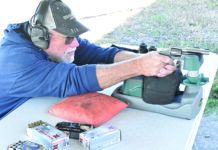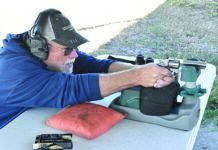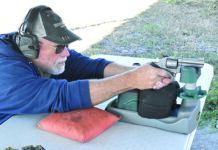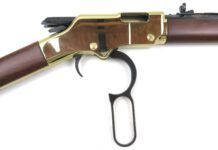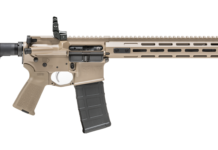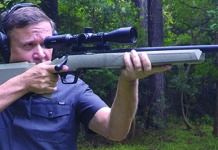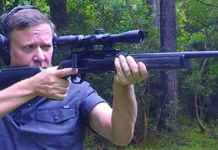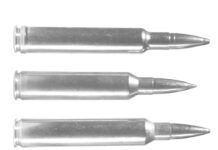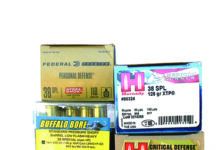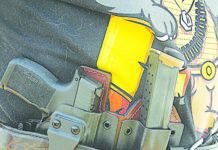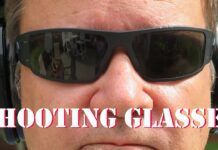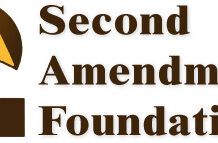Courtesy National Rifle Association Political Victory Fund
FactCheck.org supposedly exists to look beyond a politician’s claims. Ironically, in its analysis of National Rifle Association materials on Barack Obama, these so-called “FactCheckers” use the election year campaign rhetoric of a presidential candidate and a verbal claim by one of the most zealous gun control supporters in Congress to refute facts compiled by NRA’s research of vote records and review of legislative language.
There’s another possible explanation behind FactCheck’s positions. Just last year, FactCheck’s primary funding source, the Annenberg Foundation, also gave $50,000 to the Brady Center to Prevent Gun Violence for “efforts to reduce gun violence by educating the public and by enacting and enforcing regulations governing the gun industry.” Annenberg made a similar grant for $100,000 in 2005. (Source: www.AnnenbergFoundation.org
Regardless of the cause, it’s clear that while FactCheck swoons over a politician’s rhetoric, NRA prefers to look at the more mundane details — like how that politician voted on a bill and what kind of impact that legislation had or may have had on law-abiding gun owners.
FactCheck claims that NRA advertisements “distort” Barack Obama’s anti-gun positions, but FactCheck’s own sources prove otherwise. In fact, even Obama’s campaign has refused to deny his most extreme positions.
FactCheck also dismisses NRA’s statements as “contrary to what [Obama] has said throughout his campaign.” But as FactCheck says, “believing something doesn’t make it so.” And unless FactCheck is an arm of the Obama campaign, isn’t it their job to find out if Obama is telling the truth?
FactCheck claim:
FactCheck is wrong. Obama supported local handgun bans in the Chicago area by opposing any allowance for self-defense. Obama opposed an Illinois bill (SB 2165, 2004) that would have created an “affirmative defense” for a person who used a prohibited firearm in self-defense in his own home.
As FactCheck notes, the bill was provoked by a case where a Wilmette, Ill. homeowner shot an intruder in self-defense in his home; the homeowner’s handgun was banned by a town ordinance. (After the U.S. Supreme Court found Washington, D.C.’s similar ban unconstitutional, Wilmette repealed the ordinance to avoid litigation.)
The legislation was very plainly worded, but as limited as its protection was, Obama voted against it in committee and on the floor:
It is an affirmative defense to a violation of a municipal ordinance that prohibits, regulates, or restricts the private ownership of firearms if the individual who is charged with the violation used the firearm in an act of self-defense or defense of another …when on his or her land or in his or her abode or fixed place of business.
If a person cannot use a handgun for self-defense in the home without facing criminal charges, self-defense with handguns in the home is effectively banned.
Even aside from SB 2165, Obama’s support for a total handgun ban (see below) would be a crippling blow to defense in the home, since (as the Supreme Court recently affirmed) handguns are “the most preferred firearm in the nation to ‘keep’ and use for protection of one’s home and family.” District of Columbia v. Heller, 128 S.Ct. 2783, 2818 (2008).
FactCheck claim:
FactCheck is wrong. Obama voted for an amendment by longtime ammunition ban advocate Sen. Edward Kennedy (S. Amdt. 1615 to S. 397, Vote No. 217, July 29, 2005), which would have fundamentally changed the federal “armor piercing ammunition” law (18 U.S.C. ‘ 922(a)(7)), by banning any bullet that “may be used in a handgun and that the Attorney General determines… to be capable of penetrating body armor” that “meets minimum standards for the protection of law enforcement officers.”
Federal law currently bans bullets as “armor piercing” based upon the metals used in their construction, such as those made of steel and those that have heavy jackets. (18 U.S.C. ‘ 921(a)(17)). The Kennedy amendment would have fundamentally changed the law to add a ban on bullets on the basis of whether they penetrate the “minimum” level of body armor, regardless of the bullets’ construction or the purposes for which they were designed (e.g., hunting).
Many bullets designed and intended for use in rifles (including hunting rifles) have, over the years, been used in special-purpose hunting and target handguns, thus they “may be used in a handgun.”
The “minimum” level of body armor, Type I, only protects against the lowest-powered handgun cartridges. Any center-fire rifle used for hunting, target shooting, or any other purpose, and many handguns used for the same purposes, are capable of penetrating Type I armor, regardless of the design of the bullet.
Obama also said, on his 2003 questionnaire for the Independent Voters of Illinois-Independent Precinct Organization, that he would “support banning the sale of ammunition for assault weapons.” (Source: Sweet column, Chicago Sun Times) The rifles banned as “assault weapons” under the 1994 Clinton gun ban fire cartridges such as the .223 Remington and .308 Winchester – the same ammunition used in common hunting rifles.
It’s true that in 2005, Sen. Kennedy denied his amendment would ban hunting ammunition. But in a floor debate on an identical amendment the previous year, Kennedy specifically denounced the .30-30 Winchester rifle cartridge, used by millions of deer hunters since 1895. “It is outrageous and unconscionable that such ammunition continues to be sold in the United States of America,” said Sen. Kennedy. (Congressional Record, 2/26/04, p. S1634.)
Isn’t it FactCheck’s job to be skeptical of politicians’ claims, especially when the plain language says otherwise?
FactCheck claim:
FactCheck is wrong. Obama has never disavowed his support for a handgun ban. On Obama’s 1996 questionnaire for the Independent Voters of Illinois-Independent Precinct Organization, he clearly stated his support for “state legislation to …ban the manufacture, sale and possession of handguns.” Although Obama first claimed he had not seen the survey, a later version appeared with his handwritten notes modifying some of the answers. But he didn’t change any of his answers on gun issues, including the handgun ban.
FactCheck itself cites Obama’s 2003 questionnaire to the same group. When asked again if he supported a handgun ban, he could simply have said, “No.” Instead, as FactCheck notes, he “avoid[ed] a yes-or-no answer” by saying a ban on handguns “is not politically practicable,” then stated his support for other restrictions.
The 1996 and 2003 positions are not at all contradictory. Many anti-gun groups, such as the Violence Policy Center and Coalition to Stop Gun Violence, support total bans on handguns but also support lesser regulations that are more “politically practicable.”
FactCheck claim:
FactCheck is wrong. Obama’s fancy election-year footwork – claiming he doesn’t support licensing or registration because he doesn’t think he “can get that done” – isn’t enough to get around his clear support for handgun registration and licensing.
What’s really misleading is the idea that handgun registration isn’t really gun registration. Handguns are about one-third of the firearms owned in the United States, and American gun owners know better than to think registration schemes will end with any one kind of gun.
FactCheck claim:
This FactCheck claim is just strange. Don’t most Americans expect that the president will appoint people who agree with him to all levels of the government? And putting all Obama’s campaign rhetoric about “empathy” aside, why would judges be any different?
And on the larger issue of Obama’s view of the Second Amendment, FactCheck once again takes Obama’s spin at face value. While Obama now claims to embrace the Supreme Court’s decision striking down the D.C. gun ban, he refused to sign an amicus brief stating that position to the Court. And when Washington, D.C. television reporter Leon Harris said to Obama, “You support the D.C. handgun ban and you’ve said that it’s constitutional,” Obama nodded – and again didn’t disavow his support. (WJLA TV interview, 2/11/2008.)


